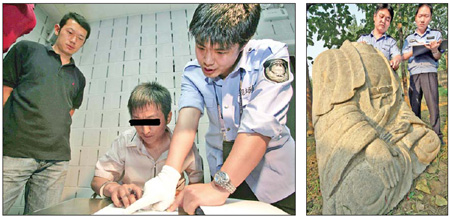Forbidden City's stolen reputation
Alarms and dogs
Besides the ordinary security measures such as patrolling and technological defenses used by other museums, the Palace Museum also has a special force - more than 10 police dogs - to safeguard the ancient imperial palace.
The museum has a patrol crew of 240 people in eight guard divisions, according to Beijing News. After 4:30 pm every day, security guards will empty the complex, checking every corner three times. At least 1,600 anti-theft alarms, 3,700 smoke detectors and 400 surveillance cameras run day and night.
Sunday night's theft is the first in 20 years from the heavily guarded historic site.
"Our work is certainly not thorough enough if something like this can happen," Feng said at a news conference on Wednesday. "However, I hope that people will not lose confidence in the Palace Museum security."
The museum is checking equipment in all its exhibition halls, storerooms and courtyards to find potential weaknesses and to improve security measures.
"Obviously they did not pay enough attention to the temporary exhibition this time," said Zhang Jie, deputy chief of display design at the Capital Museum in Beijing. "Otherwise, it would be incredible if someone could dig the hole without being noticed."
Zhang was referring to a photo posted on the Internet. The museum spokesman denied that the photo had been taken at the crime scene.
Experts said many of the security guards who patrol at night are temporary workers who have little professional experience and are paid less than permanent museum guards. Working the night strikes many as being too easy and seems to indicate a lack of a sense of duty.
"Theft is inevitable, especially as our supervision is inadequate and security guards are mixed in quality," said Zhang Shuwei, curator of Beijing Arts Museum. "We know it will definitely happen, sooner or later."
Media reports said alarms in the museum did not function during the theft. A museum spokesman declined to comment.
The Palace Museum is in the midst of improving its security systems, a process that started in October. "It will take a while for all the newly added equipment to be put into place," Feng said. "In the meantime, the old equipment still has some problems."
The total cost of the project has reached 30 million yuan (US$4.62 million), according to a Beijing-based technology company that had bid for the project. The official announcement of the cost was 12 million yuan.
 0
0 







